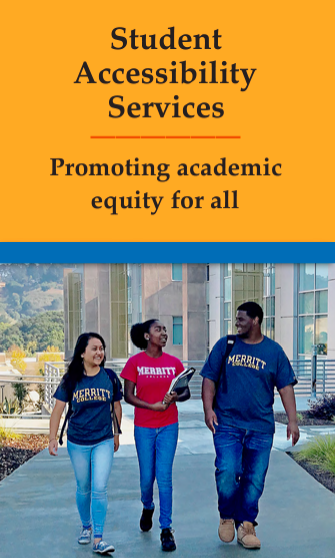Merritt College Disability Definitions:
Title 5 of the California Code of Regulations defines the following disabilities for California Community Colleges.
1. Acquired Brain Impairment:
A verified deficit in brain functioning which results in a total or partial loss of cognitive, communicative, motor, psychosocial, and/or sensory perceptual abilities.
2. Communication Disability:
An impairment in the processes of speech, language, or hearing.
3. Developmentally Delayed Learner:
The developmentally delayed learner exhibits below average intellectual functioning and has potential for measurable achievement in instructional and employment settings.
4. Learning Disability:
A persistent condition of presumed neurological dysfunction which may exist with other disabling conditions and continues despite instruction in standard classroom situations. A student must exhibit:
• average to above average intellectual ability
• severe processing deficit(s)
• severe aptitude achievement discrepancy(cies)
5. Mobility Disability:
A visual impairment, mobility or orthopedic impairment, or other health impairment.
6. Psychological Disability (mental health):
A persistent, psychological or psychiatric disorder, or emotional or mental illness. The following are not included: sexual behavior disorders, compulsive behaviors, and psychoactive substance abuse.
7. Visual Disability:
A visual impairment.
8. Other Disabilities:
This category includes all students with disabilities who are not appropriate for any of the above categories and have a major life impairment and are in need of instruction and/or support, as verified by a Merritt College DSP Counselor.





